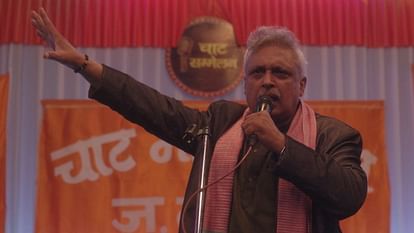Actor and writer Piyush Mishra has issued an unconditional apology for his involvement in the film “Jahangir National University (JNU)”, a political drama criticized as a propaganda piece by its detractors. In a candid interview with Dainik Jagran, Mishra revealed that his long-standing resentment towards Communist ideologies influenced his decision to participate in the project without thoroughly reviewing the script. He admitted that despite his ongoing disagreements with left liberals, agreeing to be part of the film was a significant error in judgement.
In the interview, Mishra reflected on his past associations with Communist ideologies, acknowledging that his involvement was a result of the influences around him rather than genuine conviction. He recalled his early years when he did not fully endorse Communist beliefs but felt compelled to follow the prevailing mindset due to a lack of personal direction. Over time, he recognized the limitations of these ideologies, particularly when they clashed with his basic needs and aspirations.

Piyush Mishra in JNU film (Source: Amar Ujala)
Mishra shared how his experience with Communism led him to forgo lucrative opportunities in Mumbai initially, as he prioritized ideological principles over material gain. However, this decision left him struggling financially, which ultimately caused him to question the practicality and sustainability of such beliefs. He explained that his disillusionment with Communism grew as he encountered others who had similarly become disenchanted with the ideology. This disillusionment played a crucial role in his decision to participate in the “JNU” film, which he now regrets.
“I unconditionally apologize for this. I did it because of bitterness. I am very sorry. We all make mistakes; it doesn’t matter who we are or how old we are. It was a moment of foolishness, and I made a foolish decision,” Mishra confessed. He emphasized that his decision to join the film without reading the script was unprecedented in his career, marking a departure from his usual approach to selecting roles. Despite having a minor role with just one scene, the film was marketed heavily using his name, further amplifying his regret.
Mishra explained how harboring resentment only served to make him a bitter person, a realization that prompted his heartfelt apology. “This was the first film I agreed to without reading the script,” he admitted, acknowledging the impact of his actions on his reputation and personal growth. The actor expressed his desire to move forward by learning from this mistake and encouraging others to do the same, regardless of their age or experience.
While Mishra maintains his dislike for leftist ideologies, he insists that he knows their true nature based on his personal experiences. “Usme koi compromise nahi hai, mujhe maalum hai leftists ki aukaat kya hai (There is no compromise on this front, I know the truth about leftists),” he stated, reiterating that his participation in the film was a mistake fueled by his past grievances. He expressed his resolve to let go of the bitterness that had influenced his decision-making and focus on more positive endeavours.

Scenes from JNU film (Source: LatestLY)
The film “JNU: Jahangir National University” directed by Vinay Sharma has received a poor rating of 1 out of 5 stars. Despite Jawaharlal Nehru University’s esteemed reputation, the film sacrifices factual accuracy to express animosity toward JNU, centering on student activism through the protagonist, Saurabh Sharma. The campus, depicted as leftist, becomes a battleground when Sharma aligns with characters Akhilesh Pathak and Richa Sharma (Urvashi Rautela) against Krishna Kumar (Atul Pandey) and Saira Rashid (Shivjyoti Rajput). Thinly veiled as fiction, it draws parallels to real figures like Kanhaiya Kumar and Sheila Rashid, portraying the 2016 JNU sedition row from a right-wing viewpoint. The film disparages Jawaharlal Nehru’s legacy, ignoring key alumni like Nirmala Sitharaman. Its skewed narrative, evident in omissions and negative stereotypes, lacks depth, reducing characters to caricatures and failing to engage viewers. Poor editing and screenplay further diminish its appeal, resulting in a partisan, distasteful depiction.
Mishra’s apology underscores the complexities of navigating ideological differences and the impact of personal experiences on professional choices. By acknowledging his error, Mishra hopes to inspire others to critically evaluate their decisions and embrace growth through reflection and learning.
In conclusion, Piyush Mishra’s apology for his involvement in the “JNU” film highlights the importance of self-awareness and accountability in navigating complex ideological landscapes. His candid acknowledgment of past mistakes serves as a reminder that growth and change are possible, even after moments of folly. Mishra’s reflections on his journey from disillusionment to self-discovery offer valuable insights into the interplay between personal beliefs and professional decisions, emphasising the significance of making informed choices aligned with one’s values.
Read Also:



















































































